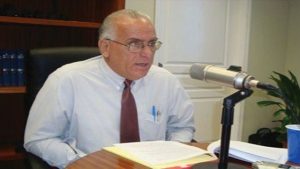 BASSETERRE, St Kitts — Former Cabinet minister Dwyer Astaphan has raised more questions about the recently announced “Hurricane Relief Fund” (HRF), which offers St Kitts and Nevis citizenship to successful applicants in exchange for a contribution of US$150,000, sharply reduced from the contributions hitherto required.
BASSETERRE, St Kitts — Former Cabinet minister Dwyer Astaphan has raised more questions about the recently announced “Hurricane Relief Fund” (HRF), which offers St Kitts and Nevis citizenship to successful applicants in exchange for a contribution of US$150,000, sharply reduced from the contributions hitherto required.
The St Kitts and Nevis government has issued a number of contradictory press statements on the issue, first of all claiming that the required total contribution remained the same, namely, US$250,000 for a single applicant and US$300,000 for a family of four to be paid into the Sugar Industry Diversification Foundation (SIDF), with a “proportion” going to the new HRF.
Then, in a notice to agents, it stated that the new contribution requirement of $150,000 would be paid to the new fund as a third investment option, with no reference to the SIDF.
Most recently, the government said that an as yet undisclosed “proportion” of the $150,000 payment would be placed in the new hurricane fund but has so far failed to answer questions as to the exact amount of this “proportion” or where the remaining funds would be paid.
“Ordinarily, in an application for citizenship under the SIDF option once approval is obtained, I am told that the money is paid into the SIDF escrow account at National Bank and SIDF pays all government administrative fees which can run between $50,000 and over $100,000 dollars per transaction depending on the number of people in the application.
“I am told that for the time being with regard to the Hurricane Relief Fund, the arrangement will be the same, in other words the arrangement will be for the funds to be sent via the Citizenship by Investment Unit into the same SIDF escrow account at the National Bank until a different and separate system is arranged for the Hurricane Relief Fund,” Astaphan told WINN FM.
He also asked about the relationship between the HRF and the SIDF.
“If the SIDF is not involved in the process, why would funds be placed into the SIDF escrow account? If this has nothing to do with the SIDF, you apply to the government, the CIU is the host of the programme, why should the money go into an SIDF account? If this has nothing to do with the SIDF, which is a separate foundation that we’re told has no legal tie with the government, then how can the SIDF’s escrow account be used? If this is strictly a transaction between the government and the applicant and it is, as far as I am seeing here anyway, then shouldn’t the funds be paid in accordance with section 69 of the constitution, that is to say, either into the consolidated fund or into another government account established under law for that particular purpose?” Astaphan asked.
Predictably, the opposition St Kitts-Nevis Labour Party (SKNLP) has seized on the government’s continued mishandling of the issue, saying that the new option lacks the necessary legislative backing, lacks the appropriate oversight as was the case with the SIDF and creates a slush fund.
Opposition politician Dr Terrance Drew said last week that he is in agreement with critics who claim the substantially reduced contribution level is designed to undermine hurricane-ravaged Antigua and Barbuda and Dominica, both of which have similar citizenship by investment programmes.
“It’s like having a brother who unfortunately is down at the moment and although you pretend to give a helping hand, has a knife stuck in the back of that same brother,” Drew said. “It is like taking advantage of the unfortunate circumstances of Dominica and Antigua and Barbuda.”
In its latest attempt at damage control, the government claimed on Saturday that the new hurricane fund is not, after all, designed to benefit St Kitts and Nevis exclusively but also “to provide additional support for disaster relief efforts in nearby islands which suffered far greater damage”.
